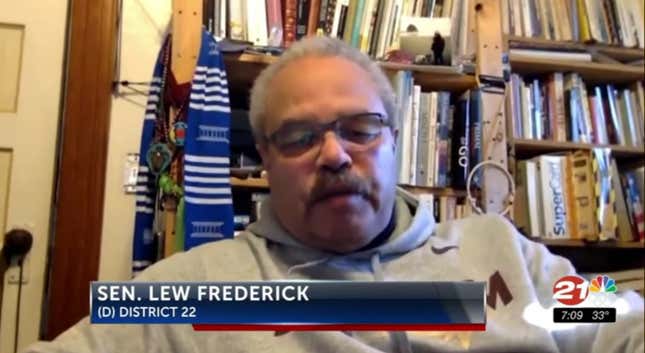
America’s racial awakening has brought about a number of positive changes—or at least earnest attempts at bringing change. The spotlight on systemic racism in policing, for example, appears to have lawmakers (mostly Democratic, but still) taking police reform more seriously than ever before. But when it comes to racial injustice and inequality, police brutality is hardly the only issue—structural racism isn’t a single-issue thing—because the fact is that Black people’s entire American history is tied to our present state of inequality. That’s why it warms the heart to see lawmakers taking the discussion around reparations seriously.
An Oregon state senator has recently sponsored two bills aimed at making reparations for Black Oregonians a reality.
Sen. Lew Frederick (D-Portland), who is Black, told KTVZ 21 on Monday that he grew up near Martin Luther King Jr. and was heavily influenced by his message and by the civil rights movement in general.
“He was the father of my playmate, so he was the dad the told me to ‘quit running through the house,’” Frederick said.
Now, as a state senator, Frederick has proposed Senate Bills 618 and 619, both of which revolve around the prospect of paying restitution to the Black descendants of American slavery victims who live in Oregon.
“[Senate Bill] 618 really says: Is there a case to be made for reparations? That’s what 618 does,” he said. “(Senate Bill) 619 says if there is a case to made, how will that be done.”
From KTVZ:
The latter bill states: “The Department of Revenue shall establish a program to pay reparations to Black Oregonians who can demonstrate heritage in slavery and who submit an application to the department no later than December 31, 2022.
“The department shall pay to each eligible applicant the amount of $123,000 in the form of an annuity payable annually for the life of the applicant,” it says.
Frederick’s chief of staff, Nathan Soltz, clarified that the amount listed is a total of $123,000, paid in annual annuity installments. Though it’s all open to negotiation, the legislation “provides for annual lifetime payments from an annuity with a principal of $123,000,” he said.
But Frederick said the details are not set in stone.
“Part of governing, part of being in a situation like this is that you bring up issues, then you discover how you could resolve those issues,” he said.
$123,000 paid in annual installments isn’t much—certainly not for the 400 years that the nation has spent systematically blocking Black people from an equal shot at the American dream—but it’s something. Of course, the stipulation that Black Oregonians “demonstrate heritage in slavery” presents an obvious roadblock as this little thing called slavery happened and a lot of Black heritage and lineage got erased.
Still, Frederick isn’t the only one in the state pushing for reparations. According to the Oregonian, the city of Portland plans to lobby the federal government to provide reparations for Black and Indigenous communities this year.
From the Oregonian:
Financial payments or other aid to the descendants of enslaved Black Americans and Native Americans harmed by the U.S. government was the top racial justice measure listed in Portland’s annual federal policy agenda, which the City Council approved last week.
“The federal government has to be a partner in any type of reparations conversation,” said Commissioner Jo Ann Hardesty.
Hopefully, the subject of reparations will continue to gain momentum. It’s long overdue.



